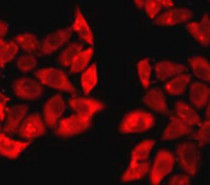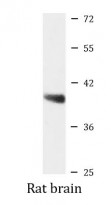ARG41038
anti-PPID / cyclophilin 40 antibody
anti-PPID / cyclophilin 40 antibody for ICC/IF,Western blot and Human,Mouse,Rat
Overview
| Product Description | Rabbit Polyclonal antibody recognizes PPID / cyclophilin 40 |
|---|---|
| Tested Reactivity | Hu, Ms, Rat |
| Tested Application | ICC/IF, WB |
| Host | Rabbit |
| Clonality | Polyclonal |
| Isotype | IgG |
| Target Name | PPID / cyclophilin 40 |
| Antigen Species | Human |
| Immunogen | Recombinant fusion protein corresponding to aa. 161-370 of Human PPID (NP_005029.1). |
| Conjugation | Un-conjugated |
| Alternate Names | CYPD; 40 kDa peptidyl-prolyl cis-trans isomerase; PPIase D; CYP-40; Cyclophilin-40; EC 5.2.1.8; Peptidyl-prolyl cis-trans isomerase D; Rotamase D; Cyclophilin-related protein |
Application Instructions
| Application Suggestion |
|
||||||
|---|---|---|---|---|---|---|---|
| Application Note | * The dilutions indicate recommended starting dilutions and the optimal dilutions or concentrations should be determined by the scientist. | ||||||
| Positive Control | Rat brain | ||||||
| Observed Size | 41 kDa |
Properties
| Form | Liquid |
|---|---|
| Purification | Affinity purified. |
| Buffer | PBS (pH 7.3), 0.02% Sodium azide and 50% Glycerol. |
| Preservative | 0.02% Sodium azide |
| Stabilizer | 50% Glycerol |
| Storage Instruction | For continuous use, store undiluted antibody at 2-8°C for up to a week. For long-term storage, aliquot and store at -20°C. Storage in frost free freezers is not recommended. Avoid repeated freeze/thaw cycles. Suggest spin the vial prior to opening. The antibody solution should be gently mixed before use. |
| Note | For laboratory research only, not for drug, diagnostic or other use. |
Bioinformation
| Database Links | |
|---|---|
| Gene Symbol | PPID |
| Gene Full Name | peptidylprolyl isomerase D |
| Background | The protein encoded by this gene is a member of the peptidyl-prolyl cis-trans isomerase (PPIase) family. PPIases catalyze the cis-trans isomerization of proline imidic peptide bonds in oligopeptides and accelerate the folding of proteins. This protein has been shown to possess PPIase activity and, similar to other family members, can bind to the immunosuppressant cyclosporin A. [provided by RefSeq, Jul 2008] |
| Function | PPIases accelerate the folding of proteins. It catalyzes the cis-trans isomerization of proline imidic peptide bonds in oligopeptides. Proposed to act as a co-chaperone in HSP90 complexes such as in unligated steroid receptors heterocomplexes. Different co-chaperones seem to compete for association with HSP90 thus establishing distinct HSP90-co-chaperone-receptor complexes with the potential to exert tissue-specific receptor activity control. May have a preference for estrogen receptor complexes and is not found in glucocorticoid receptor complexes. May be involved in cytoplasmic dynein-dependent movement of the receptor from the cytoplasm to the nucleus. May regulate MYB by inhibiting its DNA-binding activity. Involved in regulation of AHR signaling by promoting the formation of the AHR:ARNT dimer; the function is independent of HSP90 but requires the chaperone activity. Involved in regulation of UV radiation-induced apoptosis. Promotes cell viability in anaplastic lymphoma kinase-positive anaplastic large-cell lymphoma (ALK+ ALCL) cell lines. May be involved in hepatitis C virus (HCV) replication and release. [UniProt] |
| Cellular Localization | Cytoplasm. Nucleus, nucleolus. Nucleus, nucleoplasm. [UniProt] |
| Calculated MW | 41 kDa |
Images (2) Click the Picture to Zoom In
-
ARG41038 anti-PPID / cyclophilin 40 antibody ICC/IF image
Immunofluorescence: A549 cells stained with ARG41038 anti-PPID / cyclophilin 40 antibody.
-
ARG41038 anti-PPID / cyclophilin 40 antibody WB image
Western blot: 25 µg of Rat brain lysate stained with ARG41038 anti-PPID / cyclophilin 40 antibody at 1:1000 dilution.







